Namibia
Namibians went to the polls on Wednesday to elect a president and members of the country’s 96-seater National Assembly.
Thousands of voters are expected to cast their ballots across the over 4,000 polling units in 14 regions of the southern African nation.
The Electoral Commission of Namibia, ECN, has urged all eligible citizens to turn out to cast their ballots and help entrench the electoral and democratic culture of the country.
Notemba Tjipueja, ECN Chair said: “The ECN is urging all eligible Namibian vote to go to the polling stations to cast their vote. to be eligible to vote to use his right to vote, guaranteed to every one Namibia citizen to elect their representatives at national level.”
The commission has also promised to deliver a credible elections despite the opposition concerns over the use of electronic voting machines (EVMs), claiming the absence of paper records raises prospects of fraud.
“There have been no problems with the use of the EVMs (electronic voting machines) in any of the elections that we have There have been no malfunctioning of the EVMs in any of the elections we have held, so that is the factual position,” the elections chief stressed.
In this article, we will track progress of the electoral process until official results are declared.
- Presidential candidates
- Why is this election tight?
- What issues dominated campaigns?
- Why is the army on high alert for violence?
- Key figures
Presidential candidates
President Hage Geingob, Namibia’s third leader since the sparsely populated and mostly arid country freed itself from the shackles of apartheid South Africa in 1990, is seeking a second and final term from 1.3 million registered voters.
“I campaigned like hell but if I lose I will accept that. I am a democrat,” Geingob told reporters shortly after voting.
He faces nine challengers including Panduleni Itula, a dentist-turned-politician who is a member of the ruling SWAPO party but is running as an independent. Itula is popular with young people, nearly half of whom are unemployed.
Tight election
This election is expected to be the toughest contest yet for the party that has ruled for three decades of independence, an election it was still expected to win despite a brutal economic crisis.
Concurrent legislative polls will elect 96 members of parliament, testing SWAPO’s 77-seat majority. Polls opened at 7 a.m. (0500 GMT) and close at 9 p.m. (1900 GMT).
Results are expected within 48 hours.
Election issues
Namibia’s ruling party has successfully tackled problems left over from decades of neglectful rule by a German colonial and later white minority South African administrations. The proportion of Namibians living below the poverty line fell by three quarters, from nearly 70 percent in 1993 to 17 percent in 2016, according to World Bank figures.
“Namibia has gone through a very terrible time,” Leevylee Abrahams said, after casting his vote. “But I’m voting for continuity because I believe that this government can really improve the lives of people, given a chance again.”
But now SWAPO is contending with an economy that has been in recession for nearly three years, one of Namibia’s worst-ever droughts and the biggest corruption scandal in its history — all of which have conspired to make this election unexpectedly tough for Geingob, who won by 87% last time.
The economy has been marred by a drought that ravaged agricultural export crops, as well as by unprofitably low prices for Namibia’s main hard commodities, uranium and diamonds.
The Bank of Namibia expects the domestic economy to contract for a third year in 2019, by 1.7%.
A scandal in which two ministers were alleged to have conspired to dole out fishing licences to Iceland’s biggest fishing firm, Samherji, in return for kickbacks has also taken the shine off the ruling party.
Possible election violence?
Whether the result is close or not, a SWAPO win is likely to be controversial, especially since the court threw out a case mounted by the opposition against the use of electronic voting machines it fears will be used to cheat.
The military said in a statement it was on high alert for violence, which Namibia has avoided in previous polls.
A look at the key figures involved
- Fifteen contesting parties, ten presidential candidates are vying
- The voter population stands at 1,358,468
- Gender breakdown – 717,809 (females) and 640,659 (male)
- There are 4,241 polling stations across the 14 regions
- Most populous region is Khomas (257,559) and least populous Ohangwena (44,502)
- Persons under 40-year-old (Generation Y) make up 710,648 of voters (52%)




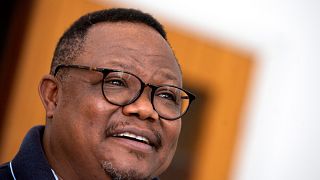
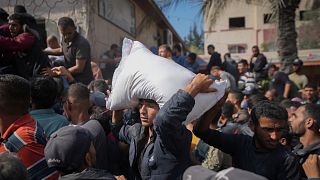

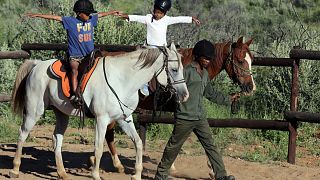
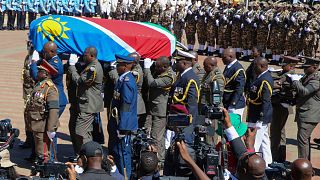
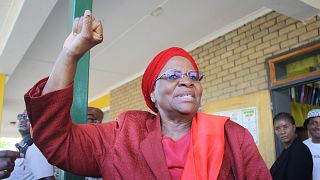


Go to video
Tanzania opposition says jailed leader not seen by family, lawyers
Go to video
Tunisia jails opponents, critics of President Saied
Go to video
Uganda plans law to allow military prosecution of civilians
Go to video
Tanzania opposition protests election ban
01:02
Former Guinean junta leader Moussa Dadis Camara leaves country for medical reasons
00:57
Gabon: Oligui Nguema clinches a landslide win